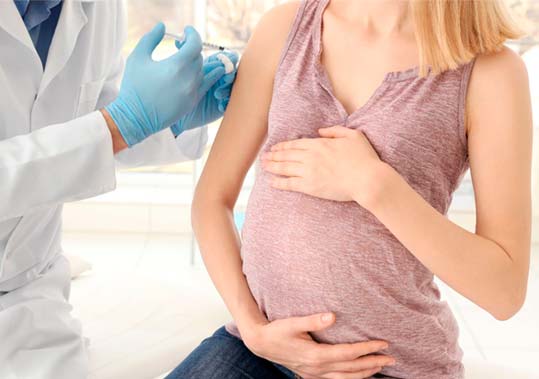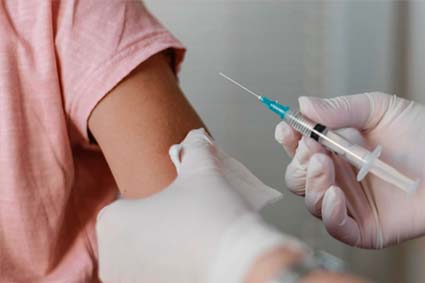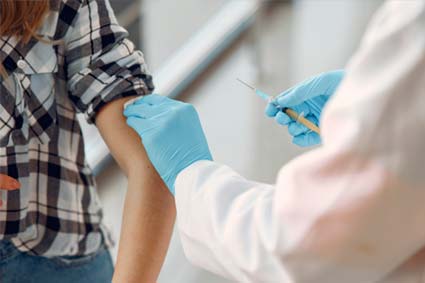A vaccination during pregnancy is essential to avoid many diseases. Therefore, it is essential to be aware of all the indicated periods.
If you want to know more about the vaccination during pregnancy, continue reading this article.

Why get vaccinated during pregnancy?
Avoid diseases during pregnancy
This is the case with the flu. In fact, the flu can cause serious complications during pregnancy, both for the mother and for the fetus, which runs the risk of being born prematurely or stillborn.
However, the influenza vaccine has a short duration of action. If a woman is vaccinated before pregnancy, knowing that it is not always possible to predict the time of conception, it is very likely that we will have a delayed influenza season.
Therefore, to protect pregnant women from possible complications, they should be vaccinated during pregnancy. It is estimated that women are still at increased risk of complications in the first two weeks after giving birth.
Prevent diseases in babies
This is the case with whooping cough and influenza. In fact, despite the introduction of vaccination in the 1950s, whooping cough continues to circulate among the population, with an incidence that is even increasing in many countries.
This appears to be due, among other things, to a reduced effectiveness of the acellular vaccine against the transmission of bacteria, as well as a lower effectiveness against the disease compared to the cellular vaccine.
However, whooping cough is especially dangerous for babies under 6 months of age, causing apnea, cardiorespiratory failure, and death.
In recent years, in Switzerland, around thirty children are hospitalized each year, a quarter of whom are in intensive care, and an average death occurs every three years.
Passive immunization by intrauterine transfer of antibodies from the mother protects infants before primary vaccination at 2 months of age.
Knowing that antibody levels drop rapidly after vaccination, the best way to optimize these levels is to vaccination during pregnancy. In the same vein, vaccinating the mother against the flu can prevent serious complications in the newborn.
Learn more about vaccination during pregnancy

Vaccines play an important role in preserving the health of women and their children before and during pregnancy and after childbirth.
Vaccines recommended before delivery
For women of childbearing age and, in particular, for women about to become pregnant, it is recommended to consult which vaccines are recommended for all adults in general, and pregnant women in particular.
- Vaccines against measles, mumps, rubella and chickenpox.
A woman planning to become pregnant is advised to check whether she is vaccinated against measles, mumps, rubella and chickenpox.
Vaccines against these diseases are live attenuated vaccines and are not given during pregnancy, even to women who are not vaccinated against these same diseases.
Why is it recommended to get the vaccine?
There are risks to the health of women and the fetus if a woman is infected during pregnancy with these diseases:
- Measles – A woman who has measles during pregnancy has a high risk of premature birth and miscarriage.
- Mumps – A woman with mumps in the first trimester of pregnancy has a high risk of stillbirth.
- Rubella – A woman who has rubella during pregnancy is likely to lose her fetus. In addition, there is a high risk that the fetus will have serious deformities, including heart, eye, and brain deformities.
- Chickenpox – A woman with chickenpox during pregnancy is at high risk of serious illness and complications such as pneumonia. In addition, there is a risk that the newborn will be born with deformities.
For vaccination against measles, mumps, rubella and chickenpox, it is necessary to administer two doses of vaccines against these diseases at intervals of at least one month or have confirmation of contamination by the disease (through a blood test).
It is recommended that a pregnant woman who is not vaccinated against these diseases and exposed to a person with one of the diseases or shingles.
- Papillomavirus vaccine
As part of the recommended routine immunization for women of childbearing age, it is recommended that women aged 9 to 26 years be vaccinated against human papillomavirus.
The vaccine is not recommended during pregnancy.
Since the human papillomavirus vaccine is a live attenuated vaccine, it cannot be given to pregnant women. Therefore, it is recommended that women who have not received the vaccine get the vaccine before becoming pregnant.
Why is it recommended to get the vaccine?
Vaccination against human papillomavirus prevents most cases of cervical cancer and a significant proportion of cases of cancer of the vulva, vagina, anus, mouth and pharynx. The vaccine also prevents genital warts.
Vaccines recommended during pregnancy

It is permitted, even recommended, to vaccinate women with certain non-live vaccines during pregnancy.
- Flu vaccine
It is recommended that all pregnant women, with each pregnancy, receive the flu vaccine.
Why is it recommended to get the vaccine?
Pregnant women are at risk of becoming seriously ill with the flu and suffering from complications. Therefore, it is very important for a pregnant woman to get vaccinated against the flu.
A pregnant woman vaccinated against influenza during pregnancy not only vaccinates herself, but also the fetus.
Babies whose mothers were vaccinated during pregnancy are less sick with respiratory tract infections in general and influenza in particular, with less hospitalization.
Studies show that the flu vaccine given to pregnant women reduces the rate of flu illness in babies up to 6 months of age by 63%.
- Whooping cough vaccine
It is recommended that every pregnant woman, during each pregnancy, receive the whooping cough vaccine, preferably between the 27th and 36th week of pregnancy.
Why is it recommended to get the vaccine?
Whooping cough is dangerous for newborns and children because of the serious complications of pneumonia and meningitis that can be caused by the disease.
It is impossible to start vaccinating a newborn against whooping cough until two months of age and until several doses of the vaccine are obtained, the baby does not have good protection against the disease.
Vaccinating a pregnant woman protects her baby in two ways:
By passing antibodies against whooping cough across the placenta to the fetus to protect it from disease after birth.
Protecting the mother so that she does not get sick and does not transmit the disease to the baby.

